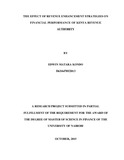| dc.description.abstract | The Kenya Revenue Authority plays a critical role of assessment of taxes, collection of
revenue, administration and enforcement of Laws relating to revenue on behalf of the
government of Kenya. In addition, according to the Act of Parliament Cap 469, KRA is
also tasked with the role of enhancing and mobilization of government revenue,
providing effective administration and sustainability of revenue collection. This noble
objective can only be achieved if the authority lays down effective strategies. However,
the current business environment is quite turbulent and as such risks abound in the
realization of KRA objectives. The objective of the study was to establish the effect of
revenue enhancement strategies on the financial performance of KRA. This study
analyzed items that influence financial performance of KRA based on seven four namely;
tax payer education, computerized operations, staff training and revenue collection
points. This study relied on secondary data that was obtained from published annual
reports and the fourth and fifth corporate strategic plans for thirteen (13) financial years
from 2002-2003 up to 2014-2015 based on the study’s variables i.e. financial
performance as affected by tax payer education, computerized operations, staff training
and revenue collection points. The data was analyzed using descriptive statistics
including frequencies, mean scores and correlation analysis. Regression models were
used to determine the existence, if any, of the relationship between financial performance
and the strategies adopted to enhance financial performance by KRA. In addition,
regression model were used to measure the quantitative data to establish the extent to
which independent variables affect the dependent variable as shown by the size of the
beta coefficients. It was established that tax payer education and revenue collection
points have strong, positive and significant effect financial performance of KRA while
computerized operations and staff training have strong, negative and significant effect on
financial performance of KRA. More training on the reforms and modernization at KRA
should be enhanced so as to improve on the skills, knowledge and professional capacity
of the employees to increase revenue. In addition, more revenue collection centers need
to be established since they have been effective in enhancing financial performance by
the Authority. Finally, the study recommends that the revenue collection process should
be continuously revised so as to ensure that the number of transaction increases and that
tax evasion is avoided. Policy makers should come up with policies that prevent the tax
evasion in Kenya. | en_US |

